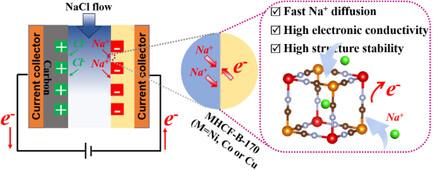Enabling High Capacity and Stable Sodium Capture in Simulated Saltwater by Highly Crystalline Prussian Blue Analogues Cathode
引用次数: 0
Abstract
Prussian blue analogues (PBAs) are considered as promising cathode materials for capacitive deionization (CDI) technology due to their 3D open‐frame structure and tunable redox active sites. However, the inevitably high content of [Fe(CN)6] vacancies in the crystal structure results in a low salt adsorption capacity (SAC) and poor recycling performance. Herein, a high‐salt nano‐reaction system is established by mechanochemical ball milling, enabling the preparation of a variety of highly crystallized PBAs (metal hexacyanoferrate, MHCF‐B‐170, M = Ni, Co, or Cu) with low vacancies (0.05–0.06 per formula unit). The reduction of vacancies in the PBAs lattice not only strengthens the conductivity and promotes the rapid transfer of electrons, but also reduces the migration energy barrier and accelerates the fast and reversible diffusion of Na+ ions. The structural characterization method and theoretical simulation demonstrates the excellent reversibility and crystal structure stability of MHCF‐B‐170 during the CDI process. Impressively, the NiHCF‐B‐170 exhibits excellent CDI performance, characterized by an exceptionally high SAC of up to 101.4 mg g−1 at 1.2 V, and demonstrates remarkable cycle stability with no significant degradation observed even after 100 cycles. This PBAs with low Fe(CN)6 vacancies are expected to be a competitive candidate material for CDI electrodes.

利用高结晶普鲁士蓝类似物阴极在模拟盐水中实现高容量和稳定的钠捕获
普鲁士蓝类似物(PBAs)因其三维开架结构和可调节的氧化还原活性位点,被认为是电容式去离子(CDI)技术中很有前途的阴极材料。然而,由于晶体结构中不可避免地存在高含量的[Fe(CN)6]空位,导致盐吸附容量(SAC)较低,回收性能较差。本文通过机械化学球磨法建立了一个高盐纳米反应体系,从而制备出了多种空位含量低(每式单位 0.05-0.06 个)的高结晶 PBA(金属六氰基铁酸酯,MHCF-B-170,M = Ni、Co 或 Cu)。PBAs 晶格中空位的减少不仅增强了导电性,促进了电子的快速转移,而且降低了迁移能垒,加速了 Na+ 离子的快速可逆扩散。结构表征方法和理论模拟证明,MHCF-B-170 在 CDI 过程中具有优异的可逆性和晶体结构稳定性。令人印象深刻的是,NiHCF-B-170 表现出了优异的 CDI 性能,在 1.2 V 电压下具有高达 101.4 mg g-1 的超高 SAC,并且具有显著的循环稳定性,即使在 100 次循环后也没有观察到明显的降解。这种具有低 Fe(CN)6 空位的 PBA 可望成为 CDI 电极的理想候选材料。
本文章由计算机程序翻译,如有差异,请以英文原文为准。
求助全文
约1分钟内获得全文
求助全文

 求助内容:
求助内容: 应助结果提醒方式:
应助结果提醒方式:


